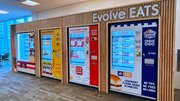Article
Nanonation: Success in the heartland
Back from a triple victory at the KioskCom awards, the software pioneer continues to set the pace for customer experience design.
June 26, 2006 by James Bickers — Editor, Networld Alliance
Inspiration strikes in unusual places, at unexpected times. Newton certainly didn't ask for the apple to hit him on the head, and likewise, many great business ideas have been born in chance encounters, the result of right-place-at-the-right-time serendipity.
For Bradley Walker, such a moment came in 1997 when his Nebraska-based software company, which was in the practice of buying up smaller, industry-specific firms, visited Oregon to work on the operational integration of his latest purchase.
"I found myself in downtown Eugene and went to a cyber café," he said. "We didn't have anything like that in Nebraska. This was before Windows 98. They just had banks of computers with a Windows desktop."
Walker went up to the counter, and asked for a coffee and some computer time. A woman took his order, and wrote down his name and the time so she could "start the clock" on his computer usage.
Light bulbs came on. Apples fell.
"I thought, hey, I could automate that task," Walker said. "And I thought, what if my mom or sister or somebody else walked in here and sat down at a Windows desktop, never having seen this before? From that premise came the idea of helping other businesses use computer screens to influence their customers' experiences and interactions. I came back from that visit intrigued by what happens when you put computers in a public space."
|
Later that year, Walker and two colleagues began work on the software platform that would be the core of the company they would call Nanonation. Officially launched in March 2000, today the company occupies an 8,500-sq. ft. office in Lincoln, Neb., and boasts growing lists of clients and industry awards.
Client-side success
The Nanonation approach - an intelligently applied mix of aesthetics and functionality - has worked for a broad range of businesses, from Dairy Queen to Arizona State University to Mazda.
One of the company's earliest projects was for Petro Stopping Centers, which operates 60 travel centers across the country. Petro was already using a kiosk at each location to run a loyalty program for truckers - but when the 9/11 attacks brought much technology spending to a halt, the company that developed and supported the program went out of business.
David McClure, director of marketing for Petro, said Nanonation called him around this time, wanting to help save the program.
"They called me out of the blue, told me what they did, and I said `Great,'" McClure said. "They immediately took over the maintenance and troubleshooting of the kiosks, and they also started on a second-generation kiosk which they developed and rolled out for us."
The next-gen kiosk system ran on Nanonation's Nanopoint software platform, which McClure said has been much more flexible and stable.

"We've added a lot of functionality over the last four years," he said. "What was a program that just redeemed points now performs a lot of informational services for the drivers. We even run advertising on it, and we used it to send out Christmas cards to our customers last year."
Walker said that the post-9/11 period was tough for everybody, but Nanonation "had the luxury of being able to plow through that and still acquire customers. Clearly, there were people who were making investments and thinking clearly. There just weren't a lot of them. And to be honest, the technology was still very expensive."
Growing ranks
The next big moment in the company's history occurred just a short time later, when Brian Ardinger joined the firm in March 2002. Ardinger, whose work as technology consultant and economic developer has taken him to Hong Kong and Silicon Valley before landing him in Nebraska, currently serves as the company's vice president of business development.
"I don't know what the company would look like without his energy and enthusiasm," Walker said.
Nanonation's industry awards 2002 Kiosk Magazine - Interface Design Excellence 2003 Kiosk Magazine - Kiosk of the Year 2004 KioskCom - Interactive Excellence Awards 2005 KioskCom - Interactive Excellence Awards 2005 Kiosk Magazine - Best Entertainment or Gaming Kiosk 2005 Kiosk Magazine - Best Digital Display 2006 KioskCom - Interactive Excellence Awards Read more about Nanonation's award-winning project for Build-a-Bear Workshops. |
Ardinger's drive comes across with a subdued, thoughtful humility. The founder of personal growth initiative Quest-4 and onetime senior consultant for Gartner downplays flattery.
"Maybe it's our midwestern roots, but this idea of growth is really based on hard work, working at a core technology and building on it, and really making sure that you can sustain the growth," he said. "It's much more of a strategic, progressive growth that we've gone through, that helped us through some of the hard times that the industry faced."
In the short time since its formation, Nanonation has won all of the major awards in the self-service industry - and in doing so, has earned a reputation as a company that is a leader when it comes to visual design and usability.
But that, too, Ardinger is quick to downplay.
"Our overarching design directive is, not design for design's sake, but the idea that you can do any transaction or interaction with a highly compelling user interface," he said. "You can either do it well or you can not do it well."
Walker said the company today is taking advantage of improved technologies like OpenGL, which gives media designers the same high-end power that game designers enjoy - like the ability to write directly to the video card, delivering media through very rich tools as opposed to the simple browser windows which have been the norm.
"I think we're one of the few companies that have successfully spanned a range of devices," he said. "We see a continuum between one-to-one interactive - the traditional self-service interaction - and one-to-many digital signage and messaging."
 ChatGPT
ChatGPT Grok
Grok Perplexity
Perplexity Claude
Claude












